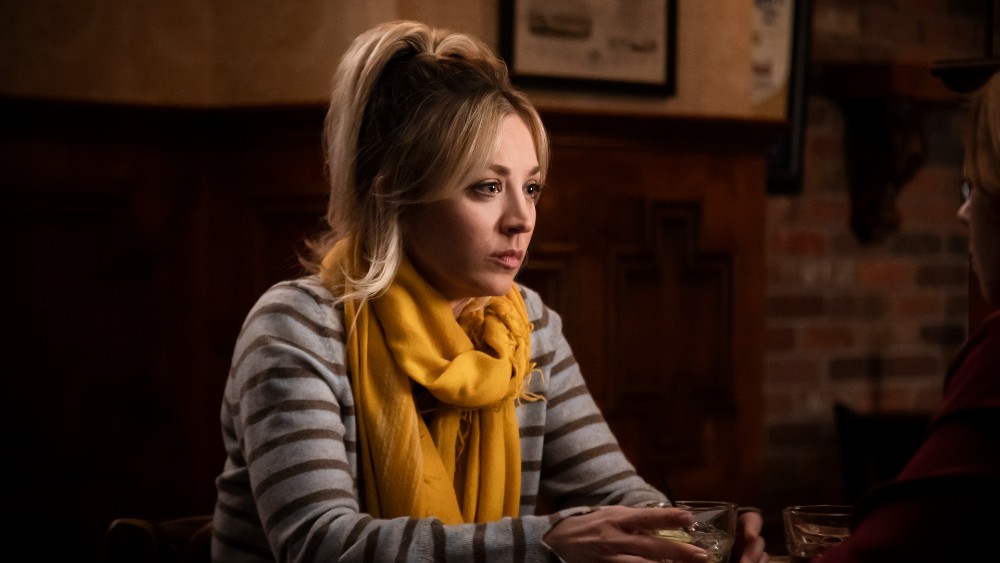
One of the biggest surprises on the television/streaming horizon over the past few months was The Flight Attendant. Starring and produced by Kaley Cuoco, it’s quirky, smart, imaginative, daring, violent, funny and at times thrilling, with top-notched (and Emmy-nominated) production values and a superlative performance by Cuoco in her first post-Big Bang Theory outing. She kills it as Cassie, a hard-partying, globe-trotting, alcoholic flight attendant who meets a great guy, Alex (Michiel Huisman), who promptly turns up dead in her bed. Did she do it? If she didn’t, does whomever murdered Alex plan to slit her throat, too?
Susanna Fogel directed and executive produced the first two episodes, and received an Emmy nomination in the Outstanding Directing For A Comedy Series category for the pilot episode, “In Case of Emergency.” The nomination is the first for the Rhode Island native whose previous writing, producing and/or directing credits include Chasing Life, The Spy Who Dumped Me, Booksmart, Amazing Stories, Utopia and The Wilds.
Below the Line recently caught up with Fogel for a candid and in-depth conversation in which she discussed her love of writing and directing, heaped praise on Cuoco, shared her thoughts on HBO Max’s decision to make a second season of The Flight Attendant, and teased not one, but two upcoming projects.
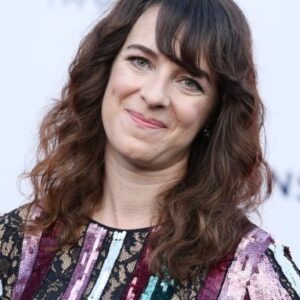
Below the Line: Congrats on the Emmy nomination. What does it mean to you personally, and what does it mean to you on behalf of the whole team behind The Flight Attendant?
Susanna Fogel: Getting nominated for an Emmy is a surreal and incredible feeling. In this business, you work for years and years, often on projects that don’t get recognized, and there’s not a direct correlation between the volume of blood, sweat and tears and the amount of accolades. That said, every so often, you work hard on a project with wonderful people in an environment that feels like a fun, healthy family… and people love what you made and want to recognize you for it. I don’t take for granted how rare that is.
And for the team at large, I think the success of the show has validated our instincts, both independently and collectively. Starting with Kaley when she optioned the book and hired Steve [Yockey], a somewhat experimental playwright to adapt it, we all took huge risks and dared to make this a very weird and specific show with a tone that’s hard to sell in a single-sentence elevator pitch. We all took a leap of faith that it would work, and the fact that it has resonated and been recognized validates that sort of risk-taking impulse in a way that feels really good and hopefully sets a high bar for all of us in projects to come.
BTL: You’ve written, produced and directed. Those are three very different but connected jobs. To your thinking, how do they inform each other?
Fogel: I love all three modes, but I am most emotionally and personally connected to writing and directing. They’re such different muscles. Writing is intensely personal and private and requires a lot of looking inward to find the truth of characters and their emotions. Also, you can do it in your pajamas, which is a huge plus. Directing, by contrast, requires you to be extroverted. It’s constant engagement with other people. You have to communicate your taste and also be flexible and open to changing your opinions and choices to incorporate better ideas from others. It takes a lot of humility, whereas with writing, you have to confidently believe that your words are worthy. As a director, you also have to master the art of being a boss: you have to be an artist, but you also have to be a good leader and set the tone for the work environment, which is a whole other type of pressure.
That said, I really enjoy both. I like the idea of fostering a creative ecosystem people enjoy being a part of, where they feel they can do their best work, and this is rewarding even if I didn’t write the script for whatever we’re shooting. As a writer — and former English major — I enjoy studying the text I’m directing and really delving into the subtext of it and deciding whether to shoot what’s on the page, or what’s between the lines. All of it requires deep analysis, which is a favorite pastime of mine as the child of not one but two shrinks.
BTL: Viewers really got caught up in the show – Cassie’s plight, the humor, the visuals, that shower, the murder mystery, etc. How surprised, or not, were you by how popular and how well-reviewed The Flight Attendant proved to be?
Fogel: From the moment I first read the script, I suspected this would be an incredibly fun show. It had so many elements of several genres that make for great television: wish fulfillment, a hint of camp, and an incredibly engaging protagonist with real, relatable friendships. And murder! Between that and Kaley’s incredibly wide-ranging fanbase, I suspected this would be a popular show. The bigger gamble, and ultimately what we’re all so proud of, is that we were able to elevate it to the extent that we did – to play within a genre that is so often maligned or mocked for being over the top and ground it in a real, lived experience and a deep exploration of an adult woman’s trauma, addiction and denial. There was a maturity to the storytelling, starting on the page with Steve’s script, that felt like a delicious alchemy with such a fun and fizzy world and tone.
I also think that as the pandemic wore on, and people were lamenting feeling stuck in one place, and missing the random connections you make during travel, there was a growing hunger in the zeitgeist for something like this. At its best, entertainment can make you feel like you’re transported to places and experiences you can’t otherwise access, and nothing could be a more extreme example of that than being trapped in your living room, quarantining from a terrifying global pandemic, with only your television to remind you of adventure and freedom. So, it was good timing, too.
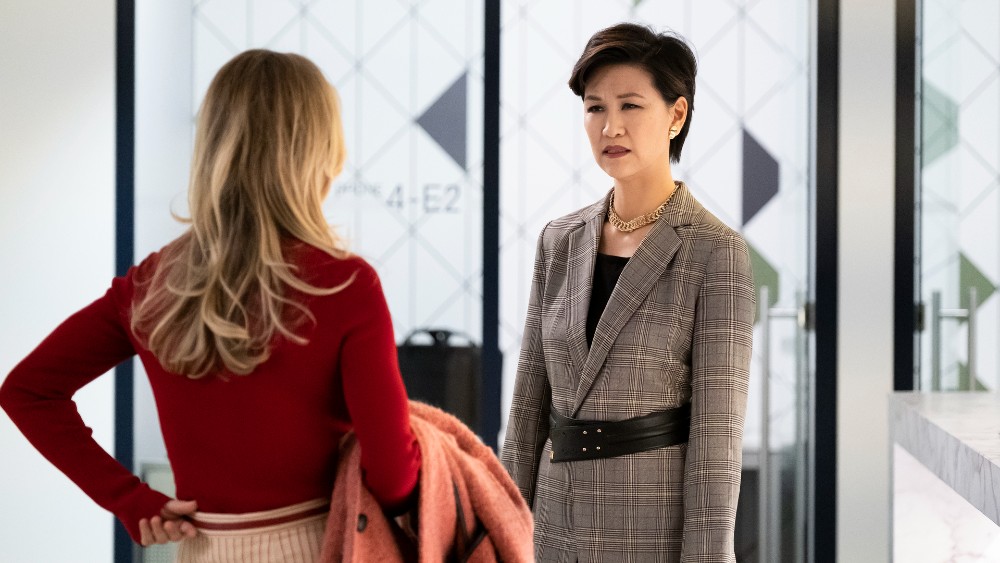
BTL: Back to the script. What was your initial reaction when you read it?
Fogel: I picked up Steve’s script with the intention of giving it a quick read, but ultimately deciding I was burnt out and wanted to focus on my own writing. By page five, however, I knew I not only wanted the job, but would murder anyone else who tried to get the job with my bare hands. What I loved so much, in addition to the thrill ride, the relatable emotions, the warmth, and the duality of sadness and humor that lives on every page, was that it felt like a revolutionary way to tell a story about a woman in her thirties. Nearly every narrative about women of that age involves a march toward an inevitable settling down. Wanderlust is equated with immaturity, something to outgrow en route to marriage and kids or something you do to run away from your problems and reality. Even in the movies and shows that are a little more flexible in their parameters for what makes a happy ending, there’s a certain narrative for women that’s pervasive.
This is a show about a woman who will never stop wanting to travel. It doesn’t end with a marriage; it ends with her making a small but meaningful choice to stop drinking that doesn’t come at the expense of a future filled with travel, joie de vivre, and adventure. That’s in Cassie’s DNA and we don’t judge her for it. This felt like a fresh, progressive, and really exciting point of view, and, as someone who personally related to it, I wanted to help it reach a wide audience.
BTL: The Flight Attendant spends a lot of time in the head of a young woman who is essentially an unreliable narrator. Simply put, she doesn’t know what happened that fateful night and what she thinks she knows may be totally wrong. Take us through the process involved in putting that on the screen.
Fogel: The Flight Attendant plays with the idea of an unreliable narrator who, despite her best efforts, is besieged by intrusive thoughts that remind her of her traumas she can’t outrun. This quite literally takes a human form, as she’s locked in a dialogue with the specter of the man she spent the night with and who was murdered. Look, it’s Freudian. And Jungian. And it’s all-around weird. Steve is a playwright who uses techniques of absurdism, surrealism that come from the theater, where things can be much more experimental. That said, we knew it was a go big or go home situation. We had to embrace the weird by giving these breaks with reality a different style from the rest of the show.
That’s how the idea of direct-to-camera address from Alex and the different, cooler light palette came into being. Speaking in the geekiest terms of color theory, the blues and greys evoke feelings of isolation, which made for a nice irony given what’s actually happening. Yes, she’s engaging with a voice that seems like it’s external and belongs to Alex, but, really, it’s all internal. She’s in dialogue with herself, her fears, her demons. In retreating to her “mind palace,” she is completely withdrawing, looking inward, and ultimately isolating herself in order to heal and process and come out the other side a person who can engage with other people in a healthier way.
In terms of the “reality” of Cassie’s world, the most important thing was to align the audience with Cassie however possible, to immerse them in her confusion but never alienate them in the chaos. For this, it was paramount that Kaley Cuoco continue to maintain her warmth and humor – which honestly, it’s impossible for her not to do. If Cassie was less likable, then her competing narratives, the puzzle, her bad behavior might have been alienating or seem like it was there for shock value. With Kaley, you’re always present and aligned with her, so you can join her on a crazy and often dysfunctional ride where you’re rooting for her — and yourself — to figure out who’s to blame, so she can be exonerated.
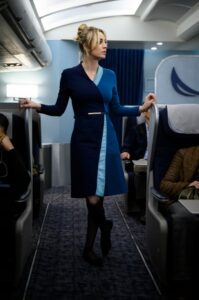 BTL: A lot of viewers think of Kaley Cuoco and immediately think broad comedy because of her long association with The Big Bang Theory. Be honest… going into this, did you know she had such great dramatic chops? And, on set, how much of a partner/collaborator, even advocate, was she for you?
BTL: A lot of viewers think of Kaley Cuoco and immediately think broad comedy because of her long association with The Big Bang Theory. Be honest… going into this, did you know she had such great dramatic chops? And, on set, how much of a partner/collaborator, even advocate, was she for you?
Fogel: Honestly, a passion of mine is to work with actresses who are known for one thing and show the world they can do something else equally well, if not better. To fight the pigeonhole together. In my first movie, for instance, I cast Leighton Meester, who was known for being antiheroine Blair Waldorf on Gossip Girl and all that entailed… and it was a complete joy to transform her into a tomboy slacker for my movie. I felt the same excitement about Kaley doing this role. It felt like a real opportunity for us to work together to create something entirely new and dynamic for her, where she could bring elements of herself that are fundamental to who she is — like her innate charm and warmth — as base layers underneath the drama, trauma, and emotion playing out in the plot. It was a challenge we calibrated and talked about every day.
So, technically, no, I had never seen her do this role, and it was a leap of faith. But after meeting her as the producer of the show and having deep, intellectual conversations with her about all aspects of the production, it was instantly clear to me that she had the dimensionality and intellectual heft to do anything she put her mind to. This was uncharted territory for her and created a sense of unpredictability and spontaneity to her performances that complemented the material incredibly well. As a collaborator, she was involved in every stage of the process. She is a bona fide hands-on producer, and was involved in every meeting from start to finish, collaborating with zero ego and tons of enthusiasm. She hired artists to head each department based on her instincts and respect for their work and ideas, then gave them free rein to create and explore and take risks. It was a dream dynamic, and I truly can’t say enough good things about working with her.
BTL: When I talk to directors, they often mention that they had to get one particular scene exactly right for everything else to work. In the pilot, for you, what was that scene, and how did you go about realizing it to your satisfaction?
Fogel: For me, it was the scene where she finds the body. Blood, terror, a hangover and a lot of George Michael.
BTL: This show wasn’t shot on a studio backlot. Much of it was on location, much of it outside the U.S. What did that add visually? And challenges – foreign crews with different languages, styles, etc.?
Fogel: Visually, shooting on location in Thailand added an immeasurable amount to the look of the show and really selling the wish fulfillment of travel to an audience, many of whom have never traveled to that part of the world. Not only the architecture and how specific it is to that region, but also just the layers and layers of humanity — which translates to design — that have existed in those outdoor locations for years. The rivers with the floating markets, the stalls, the apartments, all the layers of color and texture add to the authenticity and I wouldn’t even know where to start in creating some simulation of that on a backlot. I just don’t think it could be done.
And honestly, our Thai crew were some of the best crew I’ve ever worked with. They’re massively experienced and have a lot of infrastructure there, as Bangkok is a production hub for commercials, and they’re also some of the nicest people I’ve ever met in my life. Also worth mentioning: the scout van featured a big sign that said, “VIP STYLE,” a Batman hood ornament, and neon pink lights on the ceiling. Just figured I’d mention that as a hearty endorsement for shooting in Bangkok.
BTL: Beyond Kaley, who could you not have done your job without?
Fogel: I could not have done any of this without Steve Yockey, the brilliant and inspired and offbeat playwright who wrote the adaptation. Sara K White, my production designer, was another crucial member of the team. I’d worked with her on my last pilot, The Wilds, for Amazon, and at every turn, she elevates the look and style of whatever she’s working on. I knew she’d create something incredible here and I’m so thrilled for her that she’s been recognized with her own nomination!
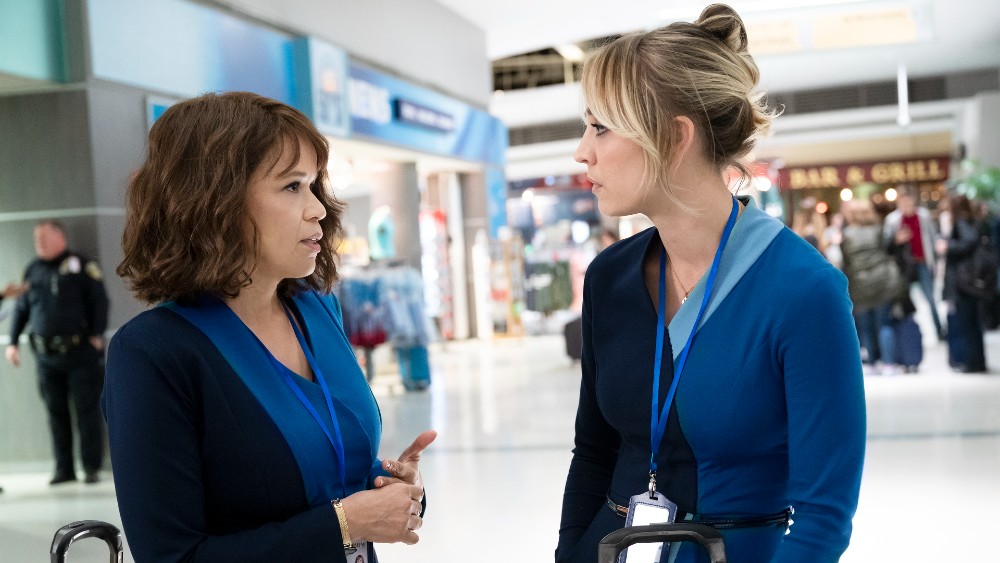
BTL: This was supposed to be a limited series. You established the show’s base with the first two episodes. What was it like to sit and watch how other directors built upon what you’d started?
Fogel: I thoroughly enjoyed watching episodes of The Flight Attendant that came after mine; for one thing, when we were shooting, the rest of the episodes had yet to be written, and stories continued to evolve throughout the filming of the rest of the series. Which is to say that I didn’t have the blueprint for where the story and each character would end up. So, watching it unfold as a viewer was really thrilling. I was also so impressed with how the look of the show evolved in dynamic and surprising ways. In particular, the Makara Prince hotel suite set had annexes and chambers that represented parts of Cassie’s mind and past that weren’t accessible in the first two episodes. So, I got to see the work of our brilliant production designer develop as the story did. It was really exciting all around. I also loved seeing how the actors developed and deepened their relationships; in particular the work Kaley and Zosia Mamet did in Episode Six was moving and deep and next level. I loved every minute of it.
BTL: Two questions about Season Two. What are your thoughts on continuing the story? And are you at all frustrated that – even though it’s for the best reason; you’re working – you won’t be able to direct any of season two?
Fogel: I’m excited for Season Two. I miss the team and would love to be back in the trenches with everyone, but selfishly I’m excited that I’ll be able to watch the whole season with no spoilers. I do wish I had the chance to work with Kaley on this new iteration of Cassie Bowden, whose story as a newly sober person is just beginning and adds a whole new layer of emotion and inner conflict.
BTL: You’ve got two other projects in the works. What excites you most about each one?
Fogel: My next project is directing a feature adaptation of Cat Person, the short story by Kristen Roupenian that went viral in the New Yorker in 2017. The vision behind the adaptation is to take everything that was painfully awkward and real about the source material and its take on modern dating and amplify it as a genre film that shows all the real fear that’s involved when we try to seek out intimacy. It’s also a very funny script. I’m really excited to do another genre-blending, genre-bending project that’s as highly visual as it is relatable.
After that, I’ll be making a biopic of Reality Winner, the millennial whistleblower who just served four years in prison for leaking a document that told the truth about election interference. She’s an incredible person who is as funny and dynamic as any fictional character in a movie, so the idea is to tell her story as a coming-of-age comedy, in contrast to the dry and dramatic whistleblower stories we’ve seen that focus only on the politics. Again, it’s a blend of genres, which is what excites me, but it’s also an incredibly important story about a young woman who was punished and silenced for doing what she felt was the patriotic thing to do. It asks all sorts of complex questions and will hopefully make people think, but do so in an entertaining way.
The entirety of The Flight Attendant Season 1 can be watched streaming on HBO Max. All photos courtesy HBO Max, except where noted. Photographer: Phil Caruso





